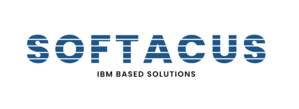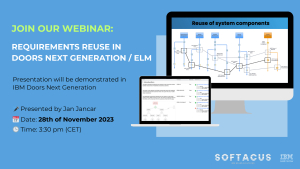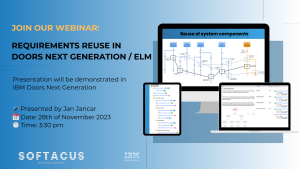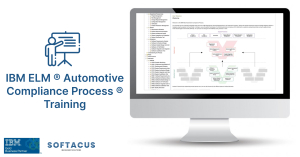Displaying items by tag: ibm doors

Are you considering a move from IBM DOORS Classic to DOORS Next Generation (DNG)? With increasing demands for collaboration, traceability, and modern workflows, migrating to DNG is becoming essential for many organizations.
However, migration isn’t just about switching tools—it requires careful planning, technical expertise, and a strategic approach. In our upcoming webinar, industry experts will walk you through the migration process, best practices, and real-world insights to ensure a seamless transition.
Yet, migration isn’t a simple click of a button. It requires careful planning, technical expertise, and a clear understanding of best practices—which is exactly what we’ll cover in our upcoming webinar.
Webinar Details
📅 Date: 25 February 2025
🕞 Time: 3:30 PM (CET)
💻 Format: Online Webinar
🎤 Speakers: Rustam Zaidullin & Jan Jancar
Link for registration: https://zoom.us/meeting/register/ocRKOfVyR2S-lZW30mYx6w

Are you looking for ways to optimize your workflows and get the most out of IBM DOORS Next Generation (DNG)? Join us for our upcoming webinar on 27th January 2025 at 3:30 PM CET, where we will explore productivity hacks designed to simplify and enhance your experience with IBM DNG.
Date: 27th January 2025
Time: 3:30 PM CET
What You’ll Learn
In this webinar, we’ll guide you through powerful techniques and tools that can transform the way you work with DNG. Here’s a sneak peek at the key topics we’ll cover:
- Working with Modules: Discover how to simplify module workflows and make them more efficient.
- Reviewing and Approving Requirements: Learn how to streamline the approval process, saving time and improving accuracy.
- Managing Variants and Configurations: Tackle complex setups with ease and maintain control over multiple module configurations.
Get Hands-On with Softacus Widgets
During the session, we’ll demonstrate how our innovative Softacus widgets can enhance your DNG productivity. These tools are designed to address specific challenges and provide solutions tailored to your requirements management needs.
Here’s what we’ll showcase:
- CMC (Custom Module Configuration): Simplify and enhance module setup and customization.
- MEX (Module Export Extension): Export modules seamlessly while maintaining data integrity.
- PEX (Process Extension): Improve process efficiency by automating repetitive tasks.
- MAS (Module Approval System): Streamline requirement approvals and ensure compliance.
- MLS (Module Link Switcher): Easily manage and switch module links with precision.
- SPJ (Softacus Project Jumpstart): Accelerate your project setup and execution.
Why You Should Attend
This webinar is perfect for professionals who manage requirements or configurations in IBM DNG and want to enhance their productivity with innovative tools and workflows. Whether you're a seasoned user or just getting started with DNG, you’ll gain actionable insights and solutions to apply immediately to your projects.
Don’t miss this opportunity to revolutionize the way you work with IBM DOORS Next Generation!
We look forward to seeing you at the webinar!

Due to the high interest in our previous webinar on Linking in IBM DNG, we are excited to announce a second session on July 23rd at 3:30 pm CET. Don't miss this opportunity!
During the session, we will continue our discussion on any topics related to links in IBM DOORS Next, such as:
- Types of Links in DNG
- Widgets
- Link Reporting
- Link terms and link sharing
- Hyperlinks
- Link constraints and more
If you would like to master your link management skills and streamline your workflow in IBM DNG, but you missed the live session, contact us at This email address is being protected from spambots. You need JavaScript enabled to view it. and we will be happy to send you the recording.

At Softacus, we excel in providing migration services from IBM DOORS to IBM DOORS Next Generation, ensuring a smooth and seamless transition for our clients.
Whether you're contemplating migrating from DOORS Classic to DOORS Next or simply seeking to explore the benefits of the latter, our upcoming webinar is for you.
Key topics that will be discussed:
- Custom link types usage for migrated links - link types can be defined based on source and target object's module path in DOORS Classic or DOORS Next
- Creation of nested Global Configurations structure based on created during migration DOORS Next streams and baselines
- Flexible definition of artifact types based either on a dedicated enumeration attribute or conditions built on queries for more attributes
We are excited to invite you to our upcoming webinar on the topic of "Commenting Options in IBM DOORS NG."
Date: January 29, 2024
Time: 3:30 - 4:30 pm CEST
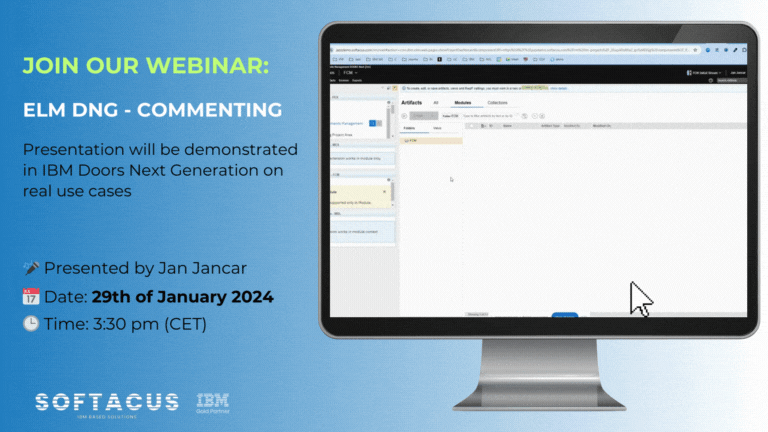
Sing up now under this link
During the webinar, we will explore essential aspects of commenting in IBM DOORS NG, including:
- Effectively using comments
- Reviewing comments
- Collaborating with internal and external stakeholders
- Techniques for exchanging comments with end customers who do not have direct access
Our Solution Director, Jan Jancar, will introduce valuable techniques, such as:
- Reviewing comments efficiently
- Commenting on base and module artifacts
- Finding comments using both out-of-the-box and attribute-based techniques
This webinar is designed to enhance your understanding of the commenting functionalities within IBM DOORS NG, providing valuable insights that can optimize your workflow.
Save your spot by registering here. After registration, you will receive a confirmation email with the webinar access details.
Feel free to invite your colleagues who might find this topic relevant.
We are looking forward to seeing you at the event!
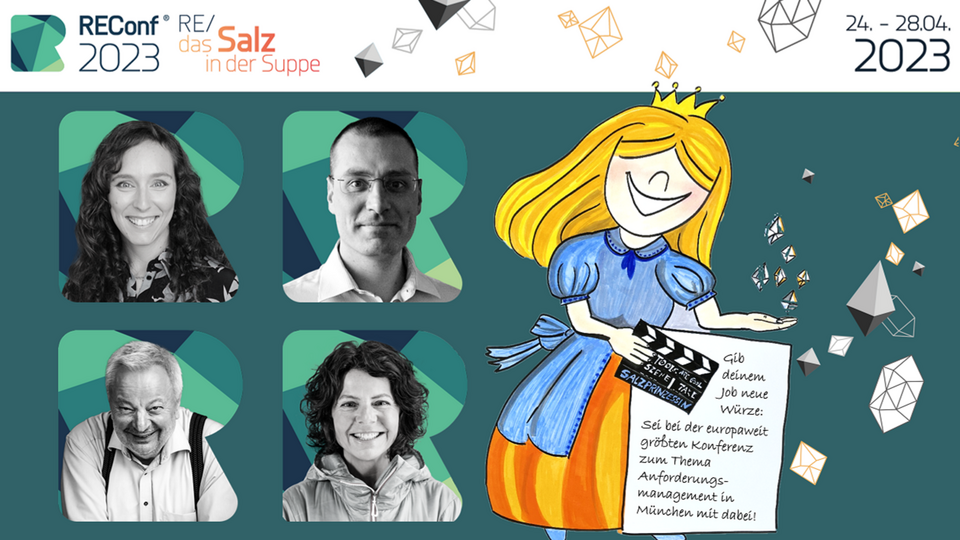
Auch dieses Jahr wird Softacus bei der REConf, die vom 24 bis 28. April 2023 stattfindet, sein.
Die REConf (Requirements Engineering Conference) ist Europas führende Konferenz mit Schwerpunkt Requirements Engineering. Auf der Veranstaltung werden neue Methoden, Trends und Tools in Vorträgen, Diskussionsrunden und Workshops diskutiert.
Am zweiten Tag der Konferenz (25 April) um 16:00 Uhr wird unser Solution Director, Jan Jancar, zusammen mit Peter Schedl von IBM, einen Vortrag zum Thema "Traceability - das Salz in der Suppe" halten.
Anforderungen sind der Ausgangspunkt der Entwicklung und somit auch der Traceability für alle Entwicklungsdaten. Projekte stellen heute bereits sicher, dass alle Kundenanforderungen in Systemanforderungen überführt wurden und Testfälle spezifiziert sind. Nicht selbstverständlich ist die Traceability in Verbindung mit KPI’s oder der toolgestützten Impactanalyse bei sich ändernden Anforderungen.
Softacus zeigt gemeinsam mit IBM Best Practices wie sich solche Szenarien mit DOORS und der Engineering Lifecycle Management Lösung einfach abbilden lassen.
Melden Sie sich für RECconf 2023 hier an: https://www.hood-group.com/reconf/anmeldung
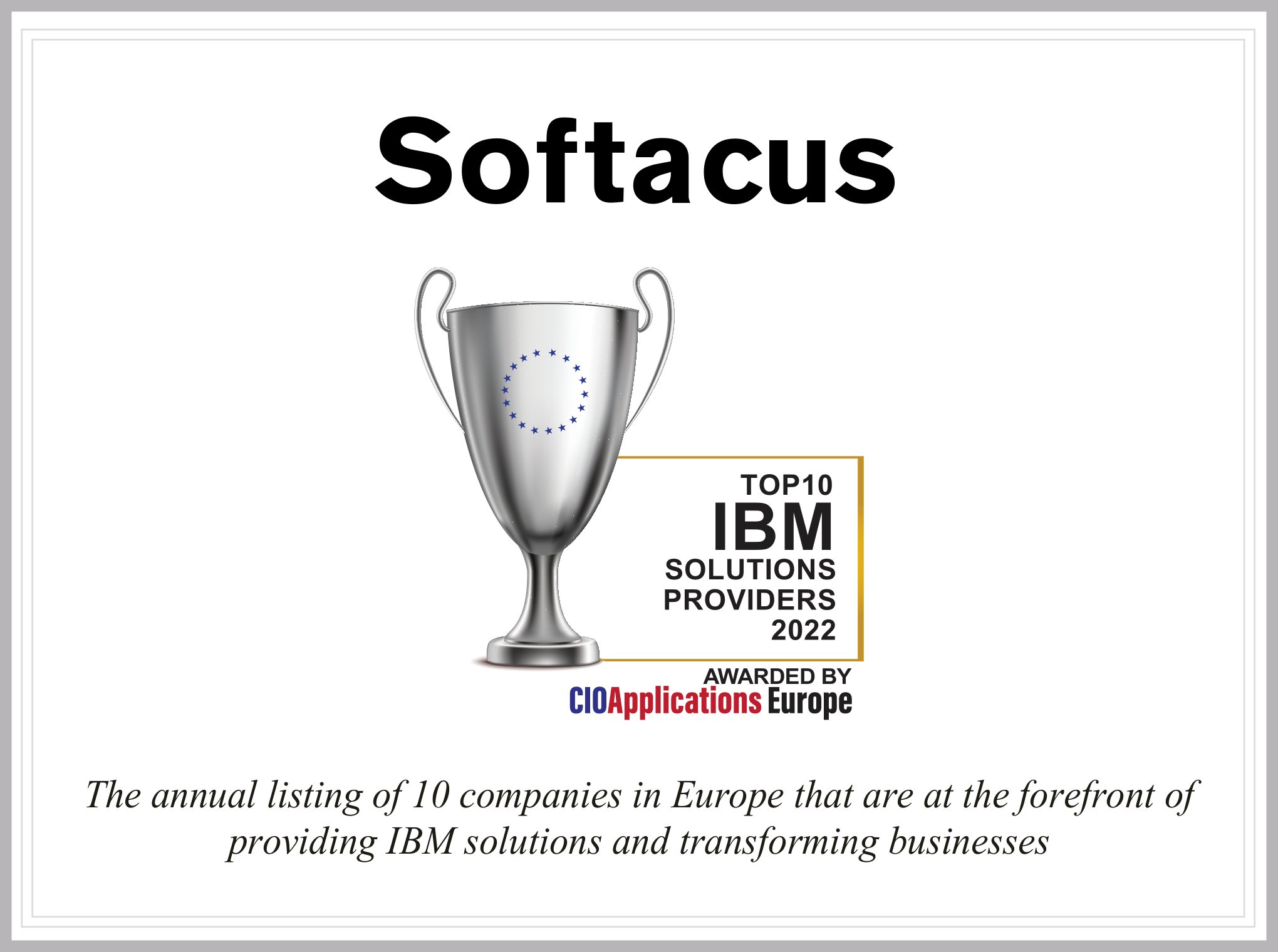
Softacus has been selected as one of the Top 10 IBM Solution providers for 2022 by the CIOApplications Europe - a popular European magazine on innovations and technology.
In this article, featured in the magazine in December 2022, our Solution Director, Jan Jancar, talks about the challenges engineering teams are facing nowadays and how Softacus and the IBM Engineering Lifecycle Management solution help organizations improve collaboration among software and system developers, increasing efficiency and product quality.

This is session 7 of 7 that covers the IBM ELM tool suite.
IBM Engineering Lifecycle Management (ELM) is the leading platform for today’s complex product and software development. ELM extends the functionality of standard ALM tools, providing an integrated, end-to-end solution that offers full transparency and traceability across all engineering data. From requirements through testing and deployment, ELM optimizes collaboration and communication across all stakeholders, improving decision- making, productivity and overall product quality.
Presented by: Jim Herron of Island Training.
